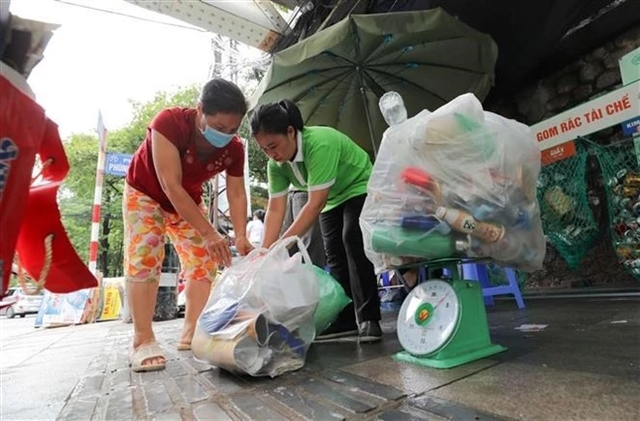 Society
Society

 |
| Residents turning in plastic waste for rewards at a local community centre in Hoàn Kiếm District, Hà Nội. VNA/VNS Photo Thanh Tùng |
HÀ NỘI — Waste should be considered a resource, which requires policies and mechanisms to help make waste treatment a part of Việt Nam’s future circular economy model, said representatives from local communities, scientists and policymakers.
According to statistics from the Ministry of Natural Resources and Environment, urban areas generate approximately 38,000 tonnes of household waste daily, while rural areas contribute around 32,000 tonnes. Rapid urbanisation in recent decades, accompanied by robust economic growth, has seen the country struggling to deal with the ever-increasing amount of waste generated at a projected growth rate of 10-16 per cent annually. Of which, industrial sectors add around 25 million tonnes a year.
A report from the Ministry of Industry and Trade said that, by the year 2025, Việt Nam’s 29 coal-fired power plants will have produced nearly 250 million tonnes of ash and slag, reaching 425 million tonnes by 2030. This tremendous amount of waste needs vast land areas for storage and treatment, along with waste generated from agricultural production, livestock farming and others. Notably, the Southeast Asian country remains one of the world’s notorious plastic polluters, releasing 1.8 million tonnes of plastic waste into the environment every year.
Nguyễn Thị Việt Nga, Deputy Head of the Hải Dương Provincial Delegation to the National Assembly, said that communities in rural areas lack proper waste collection equipment and treatment facilities, forcing people to stockpile waste in large quantities Some border zones between local administrations have become open dumping grounds. Meanwhile, urban centres face an increasing waste volume as collection and treatment systems remain woefully inadequate and inefficient, leading to widespread environmental degradation.
Professor Nguyễn Hữu Dũng, Director of the Institute for Urban and Industrial Environment of Việt Nam, said the country heavily relies on landfills, followed by composting and incineration for waste treatment. However, numerous issues remain within the current legal framework that governs waste transfer and treatment. Other challenging issues for the sector included its reliance on the state’s handouts and difficulties in waste treatment fees.
Dr Hoàng Dương Tùng, former Deputy Director General of the Vietnam Environmental Administration, said that many local governments still prefer incineration due to the complexity of transforming waste into useful resources. Despite the technical guidance from the Ministry of Natural Resources and Environment on recycling technologies, local implementation remains challenging. The Environmental Protection Law's mandate of waste segregation at the source starting January 1, 2025, will likely face numerous challenges.
Professor Bùi Thị An, former National Assembly Delegate and former Director of the Institute for Natural Resources, Environment and Community Development, highlighted the need for mechanisms to encourage businesses to take part in building modern waste treatment as a part of the circular economy.
She said that, similar to wearing helmets, something that once was uncommon, learning how to separate and treat waste responsibly can also become a habit with appropriate education and penalties.
The National Assembly’s Deputy Phạm Văn Hòa from Đồng Tháp Province said that the government should introduce additional preferential policies to encourage the private sector to take part in waste recycling, along with public awareness campaigns to promote waste segregation. —VNS




